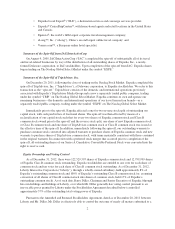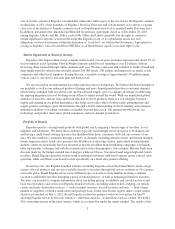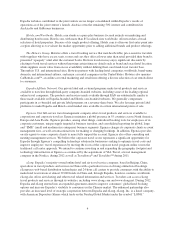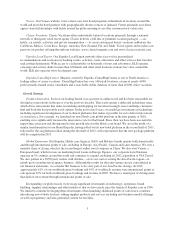Expedia 2012 Annual Report Download - page 17
Download and view the complete annual report
Please find page 17 of the 2012 Expedia annual report below. You can navigate through the pages in the report by either clicking on the pages listed below, or by using the keyword search tool below to find specific information within the annual report.We operate in an increasingly competitive global environment.
The market for the services we offer is increasingly and intensely competitive. We compete with both
established and emerging online and traditional sellers of travel-related services, including:
• online travel agencies,
• travel suppliers, including hotels and air,
• large online portal and search companies,
• travel metasearch engines,
• traditional travel agencies, wholesalers and tour operators,
• travel content sites and mobile applications including traveler review sites,
• operators of travel industry reservation databases, and
• private shopping websites.
Online travel agencies: We face increasing competition from other online travel agencies in many regions,
such as Priceline and its regional brands, Travelocity, Orbitz, as well as other regional competitors such as Ctrip
in China, which in some cases may have more favorable offerings for both travelers and suppliers, including
pricing and supply breadth. In particular, we have faced and are facing, intense global competition from Priceline
subsidiaries, Booking.com and Agoda.com. We also compete with other travel agencies for both travelers and the
acquisition and retention of supply.
Travel suppliers: Some of our competitors, including travel suppliers such as airlines and hotels, may offer
products and services on more favorable terms, including lower prices, no fees or unique access to proprietary
loyalty programs, such as points and miles. Many of these competitors, such as airlines, hotel and rental car
companies, have been steadily focusing on increasing online demand on their own websites in lieu of third-party
distributors such as the various Expedia sites. For instance, some low cost airlines, which are having increasing
success in the marketplace, distribute their online supply exclusively through their own websites and several
large hotel chains have combined to establish a single online hotels search platform with links directly to their
own websites. Suppliers who sell on their own websites, in some instances, offer advantages such as increased or
exclusive product availability and their own bonus miles or loyalty points, which could make their offerings
more attractive to consumers than ours.
Search engines: We also face increasing competition from search engines like Google, Bing and Yahoo!
Search. To the extent that these leading search engines that have a significant presence in our key markets
disintermediate online travel agencies or travel content providers by offering comprehensive travel planning or
shopping capabilities, or increasingly refer those leads to suppliers directly or other favored partners, or offer the
ability to make transactions on their own website, there could be a material adverse impact on our business and
financial performance. For example, during 2011 Google completed its acquisition of flight search technology
company ITA Software and launched a new beta product called Google Flights, in which OTA results are not
included, and separately made changes to its hotel search results to promote their own products. To the extent
these actions have a negative effect on our search traffic, our business and financial performance could be
adversely affected. Our websites, or websites in which we hold a significant ownership position, including
trivago-branded websites if we consummate our agreement to acquire a significant majority interest in trivago,
compete for advertising revenue with these search engines, as well as with large internet portal sites that offer
advertising opportunities for travel-related companies. Several of these competitors have significantly greater
financial, technical, marketing and other resources and large client bases. We expect to face additional
competition as other established and emerging companies enter the online advertising market. Competition could
result in higher traffic acquisitions costs, reduced margins on our advertising services, loss of market share,
reduced customer traffic to our websites and reduced advertising by travel companies on our websites.
11
























